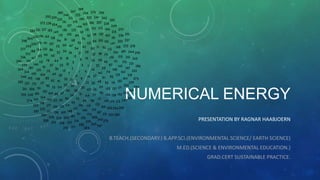Numeracy in Climate Change and Sustainability
- 1. NUMERICAL ENERGY PRESENTATION BY RAGNAR HAABJOERN B.TEACH.(SECONDARY.) B.APP.SCI.(ENVIRONMENTAL SCIENCE/ EARTH SCIENCE) M.ED.(SCIENCE & ENVIRONMENTAL EDUCATION.) GRAD.CERT SUSTAINABLE PRACTICE.
- 2. SUBJECT: LEARNING EXPEDITION Interdisciplinary: - Geography - History - Science
- 3. SUBJECT: LEARNING EXPEDITION LEX Topics - Patterns - Water - Truth - Energy - Community
- 4. UNDERSTANDING BY DESIGN Understanding by Design┬« (UbD) is a framework for improving student achievement: role as a designer of student learning UbD works within the standards-driven curriculum to help teachers clarify ŌĆó Emphasizing the teacher's critical ŌĆó learning goals revealing assessments of student understanding craft effective and engaging learning activities. ŌĆó devise ŌĆó
- 5. LEX-Energy An Essential Question: Energy: What is a responsible Energy Use?
- 13. ŌĆó LEX Energy Special Screening: CHASING ICE http://www.youtube.com/watch?v=OXCrqVE7-E
- 15. How much energy is out there?
- 22. Please Give Stephen Hawking A Call!
- 26. LEX Energy Unit-Essential Questions Q1: What is energy? Q1b: How can chemicals give out energy? Q1c: How do we get our energy? Q2: What is the electromagnetic spectrum and why is it important? Q3: What is electricity and how is it made? Q4: How can we decide the best fuels to use? Q5a: What were the environmental impacts of the Industrial Revolution? Q5b: How did the trade union movement begin? Q5c: How did some commodities become more important than others during the Industrial Revolution? Q6: What is the best way to present a convincing historical argument? Q7a: What impacts do humans have on the environment? Q7b: How can we minimise our negative environmental impacts? Q8a: What is climate change? Q8b: What evidence of climate change is there? Q9a: How do countries develop? Q9b: How can we decide what development plans will have the biggest environmental benefit? Q9c: How can conflict arise over energy? Q10a: How can development raise living standards? Q10b: What is the price of progress? Q10c: How did past energy choices influence our present lifestyle?
- 33. THE BUILDING AND BUILDING MANAGEMENT SYSTEM ŌĆó Energy Flow ŌĆó Using the diagram Building Energy Flow (PDF) found on the VLE explain ŌĆó Veranda ŌĆó Why do houses have verandas? ŌĆó Why is there a gap in Northern veranda in the Year 9 building? What does this tell us about the sun? ŌĆó Look at the mypbms shading site. Using the diagram explain how a veranda works with respect to the summer / winter solstice and the angle of the sun? ŌĆó Why do we want sun to enter the building during winter? ŌĆó Go and take a photograph of the veranda and the gap? ŌĆó Eves ŌĆó Why do buildings have eaves? ŌĆó What does the eave do in building design?
- 34. THE BUILDING AND BUILDING MANAGEMENT SYSTEM Heating and Cooling ŌĆó Use the Ventilation and Day lighting sites from the mypbms ŌĆó Where is the heating and cooling system? ŌĆó How do we heat and cool the building? ŌĆó In theory how is the heating and cooling system meant to work? Use the diagram from the TEST ROOM mypbms to help explain. ŌĆó How does thermal mass play a part in heating a building? ŌĆó Why use slab heating and cooling? ŌĆó Why is our heating and cooling system slightly different to normal air conditioning?
- 35. THE BUILDING AND BUILDING MANAGEMENT SYSTEM ŌĆó Windows ŌĆó How does double glazing work? ŌĆó Why do we have mechanical windows in our rooms? How does this help the cooling of the building during summer? ŌĆó Lights ŌĆó Explain why you think the architect designed the light well above the lecture theatre seats? ŌĆó Why would we have individual IP addresses for each light? ŌĆó Why would we have installed efficient lights?
- 37. ASSESSMENT TASK: BUILDING SUSTAINABILITY ASSESSMENT REPORT ŌĆó Each year, Year 9 students are asked to complete a Building Sustainability Assessment report with the best reports presented to Ms. Hansen and the school executive. This assessment provides you with the opportunity to demonstrate both your understanding of sustainability and to demonstrate a commitment to the Year 9 and whole school communities by seriously considering ways for maintaining optimal living and learning environments, consciously managing their energy use.
- 38. ASSESSMENT TASK: BUILDING SUSTAINABILITY ASSESSMENT REPORT ŌĆó Your task is to write a report which details design improvements which could be made to the Year 9 Building, focused on reducing our ecological footprint. To successfully complete this assignment you need to: ŌĆó Download the ŌĆśSustainable Building Design ŌĆō Council CriteriaŌĆÖ document from the VLE (Energy: Topic 7) ŌĆó Choose one design improvement, for each element in Section 1 (Energy), which will improve Sustainable Building Design requirements
- 39. ASSESSMENT TASK: BUILDING SUSTAINABILITY ASSESSMENT REPORT RUBRIC
- 40. ASSESSMENT TASK: BUILDING SUSTAINABILITY ASSESSMENT REPORT RUBRIC
- 41. ASSESSMENT TASK: BUILDING SUSTAINABILITY ASSESSMENT REPORT RUBRIC
- 42. ANALYSIS AND WAYS FORWARD
- 43. QUESTIONS?
- 44. THANK YOU ’üŖ Blog| http://thewonderingecologist.blogspot.com/ Twitter | @whyhowwho












































